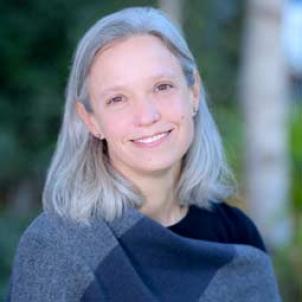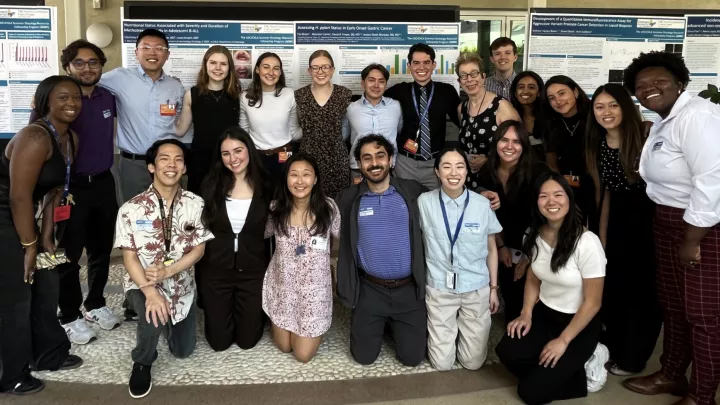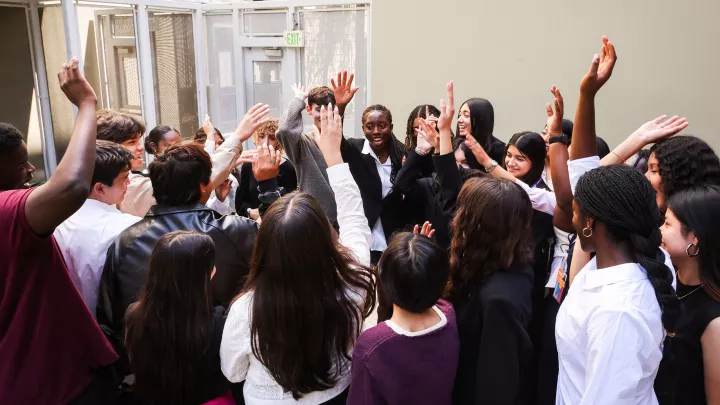
Senior Program Manager Casey Covarrubias (left side of photo, third from top), who oversees the Research Success Teams program, stands with several team members in the Office of Training, Education, Career Planning and Development (TECPAD)
A Wealth of Funding Resources: CHLA’s Research Success Teams Program Supports Junior Investigators Seeking NIH Grants
As an early career researcher, it’s understandable to view the process of securing funding from the National Institutes of Health (NIH) as daunting. That’s exactly why the Research Success Teams (RST) program at Children’s Hospital Los Angeles was created.
“The Research Success Teams program has been around for many years, but it went through a significant restructure in 2020 when Tamara Simon, MD, MSPH, from Hospital Medicine became the faculty lead of the program,” Casey Covarrubias explains. Covarrubias, a Senior Program Manager in The Saban Research Institute of CHLA who works in the Office of Training, Education, Career Planning and Development (TECPAD), oversees the Research Success Teams program. She also manages a program to train all individuals at CHLA who serve in a research mentor role and oversees the intramural research funding program.
How the program works
“The goal of the program is to support junior investigators who are seeking independent funding for their work, through a combination of informational sessions, mentorship and peer support,” Covarrubias explains. “Most of our programming focuses specifically on securing NIH and other governmental grant funding, though we can offer some assistance with applications or proposals for scientific research grants offered by other organizations.”
The Research Success Teams program welcomes any researchers who are interested in joining, and divides its members into two cohorts: those seeking NIH K awards, which are career development grants intended to support early-career investigators in developing their research skills, and those applying for NIH R01 awards, which provide funding over a longer period of time to experienced researchers who have previously received K awards. Since 2020, the number of K awards at CHLA has grown from four to 21.
Sharing applications in progress
Researchers in each cohort can attend Works in Progress meetings twice a month, where they are invited to share their in-progress grant applications with the group and with senior investigators to receive feedback and guidance. “In each of those meetings, we have one to two senior investigators who have been successfully funded and will discuss the grant application process with attendees and review the specific aims of applications that are shared,” Covarrubias explains. “So participants can receive both peer feedback and senior faculty notes on their work. And they don’t need to wait until they are nearly finished with an application—we encourage folks to bring in their applications at any stage.”

The senior researchers who facilitate these meetings include Dr. Simon, Michael I. Goran, PhD, from the Center for Endocrinology, Diabetes and Metabolism, Robinder Khemani, MD, MSCI, from Anesthesiology Critical Care Medicine, Rohit Kohli, MBBS, MS, from Gastroenterology, Hepatology and Nutrition, and Kathie Eagleson, PhD, a neuroscientist who works in the Levitt Lab. These investigators have varied areas of expertise, simulating the real-world situation in which researchers from various fields evaluate a grant application during the NIH review process.
Education and guidance on every facet of funding
Beyond the Works in Progress meetings, the Research Success Teams program hosts 20 to 25 didactic sessions each year. “We invite CHLA faculty and other speakers to come in and present on specific topics related to the successful preparation and submission of grant applications, including how to develop a budget and budget justification, how to write a successful biosketch, how to ensure regulatory compliance, how to manage data collection and presentation, and how to create a timetable for your grant application submission,” Covarrubias says.
On top of its other offerings, the Research Success Teams program also provides grant writing support services to interested participants and makes The NIH Version of The Grant Application Writer’s Workbook available to junior investigators. This workbook provides step-by-step guidance on how to write an engaging and fundable NIH grant application. Local investigators have also provided copies of their successfully-funded early career award applications for others to reference in an online repository.
“Additionally, we’ve rolled out a feature called RST+,” Covarrubias explains. “This is a unique opportunity for folks who have already received substantial funding to be paired with a senior investigator mentor who will meet with them every few months or so and provide some additional guidance on the grant process and their career trajectory.”
These senior investigator mentors include Shafali Spurling Jeste, MD, from the Neurological Institute, Beth A. Smith, DPT, PhD, who leads the Infant Neuromotor Control Laboratory, Lorraine Kelley-Quon, MD, MSHS, FACS, FAAP, from General Pediatric Surgery, and Michael Neely, MD, MSc, FCP, from Infectious Diseases. These mentors have undergone formal training through the Center for the Improvement of Mentored Experiences in Research (CIMER) and also now facilitate the semi-annual TSRI/CHLA Mentor Training Program. Since launching in 2022, 26 CHLA and USC investigators have completed the six-hour training course.
“We’re really fortunate because we have mentors from different divisions at CHLA, and we have both MD and PhD representation,” Covarrubias says. “We’re also happy for the program as a whole to have so many faculty who have volunteered to assist with the program and who have a history of having been funded by the NIH.”
A robust collection of supportive resources
The wide array of services presented by Research Success Teams represent a uniquely comprehensive mix of resources for junior investigators that is rare among research institutions like TSRI. The program will also soon be partnering with the Workforce Development team at the Southern California Clinical and Translational Science Institute to be able to extend its supportive services to clinical and translational researchers at USC as well.
Covarrubias is proud to be part of the Office of Training, Education, Career Planning and Development, which offers other programs supporting careers in scientific research for high schoolers, medical students, pediatric residents, postdoctoral fellows, and essentially every other career stage. The size of her team has doubled since she first joined, and she recognizes the value of the services they are offering.
“Our faculty are experts in their fields and give so much time to this program, providing individualized support in addition to the peer feedback that participants can receive from their fellow early career researchers,” she says. She advises any researcher interested in participating in the Research Success Teams program to email her team.
“All of us are really inspired when we see junior faculty applying for and receiving funding for their work—it's rewarding for them and for us.”


